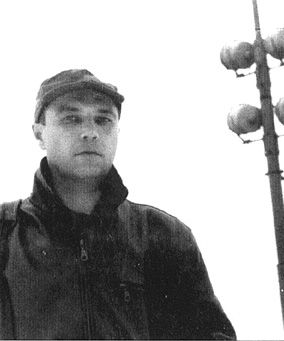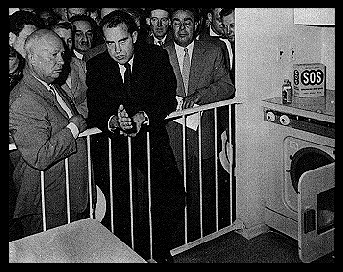Foreign Policy, Spring 2000
Dzheneraishen “P”
Granted, the Soviet Union was one big Potemkin village—a communist Disneyland stretching over 11 time zones—a virtual reality, except that those who lived there experienced it as the real thing. What, then, is today’s Russia like? Before the collapse of communism, the answer depended pretty much on which side of the Berlin Wall the observer was facing. These days, according to Victor Pelevin in his latest and most provocative novel, Generation “P,” the answer depends—in the final analysis—on the last button you pressed on the zapper of your boob tube. Welcome, then, to the oral-obsessive, anal-compulsive, image-saturated, stimulant-crazy, brand-name infatuated, ghost-infested, violence-ridden, and confusing Russia of Pelevin’s absolutely sex-free novel, which in the bargain, has turned out to be a mind-boggling commercial success. A novelist with a cult following, Pelevin has already produced two brilliant snapshots of contemporary Russia—one through the eyes of post-communist citizens metamorphosing into bugs (The Life of Insects) and another (Chapayev and Void) through the eyes of a legendary revolutionary duo, Commander Vasily Chapayev and his sidekick, Petka Void, who shuttle between 1918 and 1996 and between Moscow and Outer Mongolia under the influence of all sorts of substances and Buddhist mantras. With the publication of Generation “P,” Pelevin has launched another probe into the post-communist terra incognita, this time in the form of a dissident poet trying to find gainful employment in the country’s real world. A dissident poet? Yes, a dissident poet. Has anyone ever wondered what happened to Russia’s dissident poets, those quixotic figures who breathed romance into the cold war the way Omar Sharif breathed it into the frozen steppe in David Lean’s Doctor Zhivago? Pelevin found one such poet (unemployed, of course) and put him to good use as his alter ego: Vavilen Tatarsky, born in 1960, who became a poet by virtue of his encounter with a volume by Boris Pasternak in 1980. Like the author, Tatarsky (a significant name, given the Russian history of the Tartar yoke) came of age in the halcyon days of Premier Leonid Brezhnev’s rule, when capitalism’s inroads were measured by such momentous developments as building the one and only Pepsi bottling plant to slake the thirst of the entire Evil Empire. The capitalist beverage, even without ice, did what it was supposed to do: instill in the young pioneers sipping the warm, clawing liquid the hope that “some day the far-away proscribed world from the other side of the ocean would enter their life.” It did. We know it did. With a vengeance. But the choice of the cola brand that produced the Soviet Union’s “P” generation may also help explain why the capitalism and democracy that followed the collapse of communism have turned out to be—to put it delicately—not the real thing. As one who has also tasted Pepsi while a captive of communism, some dozen years earlier, I can attest to the beverage’s ideologically corrosive effect. It was 1959, the year of innocence; the place was Moscow’s Sokolniki Park; the event was the U.S. Industrial and Cultural Fair. For me, a Moscow youth of 13, the free Pepsi offered at the fair was even more shocking than the fair sculpture garden consisting of the tormented, twisted figures of American expressionism and the tantalizing display walls showcasing hundreds of different models of men’s shoes (incomprehensible for someone used to treating footwear as a horse treats its hoof). A line snaked around an exotic-looking bright yellow stall. Behind it, half a dozen perplexed-looking Russian women dressed in white uniforms were filling and handing paper cups with the foaming American drink to Soviet citizens. The clientele looked about furtively, avoiding each other’s eyes while standing in line. Hesitating at first, they downed the industrial-tasting cola like vodka, Russian style, and ambled away only to turn around all of a sudden and get in line again for another gulp of what had to be, a mere six years after Joseph Stalin’s death, a treasonous potion. I, too, made several rounds, an adventure facilitated by the presence of a public toilet, strategically located nearby and almost as rare in Moscow then as was a bottle of Pepsi. With each round, I felt my Soviet loyalties, a matter of course at the time, ebbing away. Buoyed by the memories and hoping to find another key to Pelevin’s novel, I tried to research the history of the U.S.
Our fictional hero, Vavilen Tatarsky, was born a year after Pepsi’s promotion came to Russia—the son of a man of the 1960s generation who, like Mikhail Gorbachev, loved the fiction of the semidissident author Vasily Aksenov as much as he worshiped Vladimir Ilyich Lenin and therefore decided to give his son a name that combined elements of both. As he was completing his studies at the Gorky Literary Institute, Tatarsky looked forward to the idyllic double existence of a Soviet intellectual: a day job as a producer of Soviet pulp, with the night devoted exclusively to the creation of poetry for eternity. But then perestroika made matters complicated, “improving the Soviet Union so much that it ceased to exist,” and with it, ending the demand for official Soviet writing. All that remained was writing for eternity. But, as Pelevin notes: “The eternity to which Tatarsky [had] decided to devote his works and days [had] also begun to change. . . . It turned out that eternity existed only in so far as Tatarsky believed in it.” Indeed, this eternity “could exist only thanks to government subsidies or, which is one and the same thing, as something that was forbidden by the state.” Disenchanted, Tatarsky abandons poetry and hires himself out as a salesmen in one of the numerous retail kiosks run by Moscow’s Chechen mafia—until his way with words finds another application. He gets rediscovered by an old classmate and fellow poet, who is now a successful purveyor of PR. Thanks to this chance encounter, Tatarsky embarks on a grand career as an advertising copywriter. At first, his special talent is employed in giving a Russian spin to famous American brands, in anticipation of an onslaught of U.S. consumer products. One of Tatarsky’s greatest hits is a slogan for Parliament cigarettes that evokes the 1993 shelling of the Russian White House: “To Us, Even the Smoke of the Fatherland is Pleasant and Sweet.” The words are those of a famous aphorism from Aleksandr Sergeevich Griboedov’s Woe from Wit, familiar to every Russian schoolchild. Emblematic of the country’s pride in its letters, the words are now used as a product wrapper for a commercial hit. The more Tatarsky is drawn into the world of the make-believe economy, the more successfully he combines his duties as an advertising kreator with an exciting career in psychedelic travel (certain Russian mushrooms apparently facilitate contact with the God of the Old Testament, as well as the more exotic ancient Babylonian deities), and Ouija board communications with the spirit of Che Guevara (the great leftist brand name), who proposes a heavily Freudian theory of consumer society. Thus enlightened, Tatarsky finally floats to the top of the super-secret and all-powerful media conglomerate that uses sophisticated computer graphics equipment for scripting, producing, and broadcasting a simulated Russian reality. Only the United States is capable of restricting the agency’s power—by controlling the speed of the graphics processors. (Just in case you have wondered why on some days Boris Yeltsin looked much more animated than on others. . . .) In Russia, Generation “P” has become required reading for everyone, and many of its clever one-liners have already entered the hip argot. Che Guevara’s spirit announces to Tatarsky through an automatic writing planchette that a new species, Homo Zapiens (from the television zapper), is taking over the world, whose oral (consume!) and anal (disgorge cash!) obsessions account for the alternative name of the species, Oranus. Both Homo Zapiens and Oranus are now part of Russian speech, along with “wow impulses”— a unit of measurement for viewer response to a commercial. Before becoming a super adman, Tatarsky writes his last poem, which can be read as an epigraph to the entire novel. Echoing Fyodor Dostoevsky’s musings in Crime and Punishment that eternity could turn out to be “one little room, something like a bath-house in the country, black with soot, with spiders in every corner” and those of the Russian rock band ddt in the song, “What is Autumn?”, the poem morphs into an extended question mark hovering over the post-Soviet, post-utopian space we call Russia: What is eternity? It’s a little bath house. Eternity
is a little bath house with cockroaches A postmodern consumerist Potemkin village, a color television screen projection of an advertising culture—this is what Generation “P” boldly suggests. <the end> |
updated: 10/27/2007

